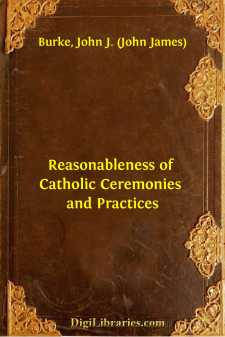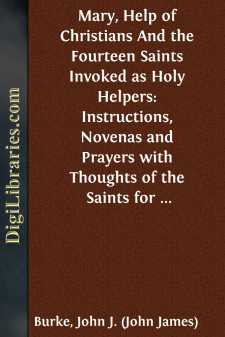Categories
- Antiques & Collectibles 13
- Architecture 36
- Art 48
- Bibles 22
- Biography & Autobiography 813
- Body, Mind & Spirit 142
- Business & Economics 28
- Children's Books 17
- Children's Fiction 14
- Computers 4
- Cooking 94
- Crafts & Hobbies 4
- Drama 346
- Education 46
- Family & Relationships 57
- Fiction 11829
- Games 19
- Gardening 17
- Health & Fitness 34
- History 1377
- House & Home 1
- Humor 147
- Juvenile Fiction 1873
- Juvenile Nonfiction 202
- Language Arts & Disciplines 88
- Law 16
- Literary Collections 686
- Literary Criticism 179
- Mathematics 13
- Medical 41
- Music 40
- Nature 179
- Non-Classifiable 1768
- Performing Arts 7
- Periodicals 1453
- Philosophy 64
- Photography 2
- Poetry 896
- Political Science 203
- Psychology 42
- Reference 154
- Religion 513
- Science 126
- Self-Help 84
- Social Science 81
- Sports & Recreation 34
- Study Aids 3
- Technology & Engineering 59
- Transportation 23
- Travel 463
- True Crime 29
Reasonableness of Catholic Ceremonies and Practices
Description:
Excerpt
The Ceremonies of the Catholic Church
THE Catholic Church in the celebration of Mass and in the administration of the sacraments employs certain forms and rites. These are called ceremonies. By these ceremonies the Church wishes to appeal to the heart as well as to the intellect, and to impress the faithful with sentiments of faith and piety.
What is more capable of raising the heart and mind of man to God than a priest celebrating Mass? What more inspiring than some of our sacred music?
How beneficial and how lasting the impression formed by the ceremonies of the Church, the following incident will show:
One of our missionaries once went to visit a tribe of Indians who had been deprived of a priest for nearly half a century. After traveling through the forest for some days he came near their village.
'Twas Sunday morning. Suddenly the silence was broken by a number of voices singing in unison. He stopped to listen. To his great astonishment he distinguished the music of a Mass, and of Catholic hymns well known to him.
What could be more touching than this simple, savage people endeavoring to celebrate the Lord's Day as they had been taught by the priest fifty years before? What more elevating than those sacred songs—the Stabat Mater, the O Salutaris, or the Te Deum—uttered by pious lips and resounding through the forest primeval? What better evidence could we have of the beneficial effects of our ceremonies in raising the heart to God?
And yet few things connected with our holy religion have been more frequently subjected to ridicule than her ceremonies. People scoff at them, laugh at them, call them foolish and unreasonable. Those people do not stop to consider that by doing so they, themselves, are acting most unreasonably. For no reasonable person, no judge, will condemn another without hearing both sides of the question.
These wiseacres, however, flatter themselves that they know all about the Catholic Church and her ceremonies without hearing her side of the case. Hence the misunderstandings and misrepresentations regarding her that exist among well-meaning people.
If people would but learn to speak about that which they knew and understood; if they would accord to the Catholic Church the same treatment as to other institutions; if they would examine both sides of the question before criticising and ridiculing her teachings and her ceremonies; if they would but treat her with that openness, that fairness, that candor, that honesty characteristic of the American citizen when dealing with other questions—what a vast amount of ignorance, of prejudice, of sin would be avoided!
We claim that ceremonies used in the worship of God are reasonable, because they were sanctioned by God in the Old Testament and by Jesus Christ and His apostles in the New Law.
I. Ceremonies Necessary to Divine Worship
THE angels are pure spirits. They have no body. Consequently the worship they render God is spiritual, interior.
The heavenly bodies are not spiritual, but entirely material substances....



